六、一般将来时
六年级英语-一般将来时(含练习题)
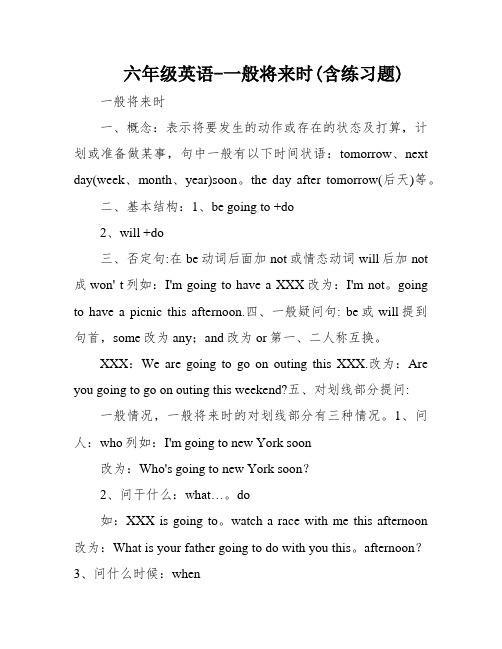
六年级英语-一般将来时(含练习题)一般将来时一、概念:表示将要发生的动作或存在的状态及打算,计划或准备做某事,句中一般有以下时间状语:tomorrow、next day(week、month、year)soon。
the day after tomorrow(后天)等。
二、基本结构:1、be going to +do2、will +do三、否定句:在be动词后面加not或情态动词will后加not 成won' t列如:I'm going to have a XXX改为:I'm not。
going to have a picnic this afternoon.四、一般疑问句: be或will提到句首,some改为any;and改为or第一、二人称互换。
XXX:We are going to go on outing this XXX.改为:Are you going to go on outing this weekend?五、对划线部分提问: 一般情况,一般将来时的对划线部分有三种情况。
1、问人:who列如:I'm going to new York soon改为:Who's going to new York soon?2、问干什么:what…。
do如:XXX is going to。
watch a race with me this afternoon 改为:What is your father going to do with you this。
afternoon?3、问什么时候:when列如:She's going to go to bed at nine 改为:When is going to bed?六、同义句:。
一般将来时的单词变化规则
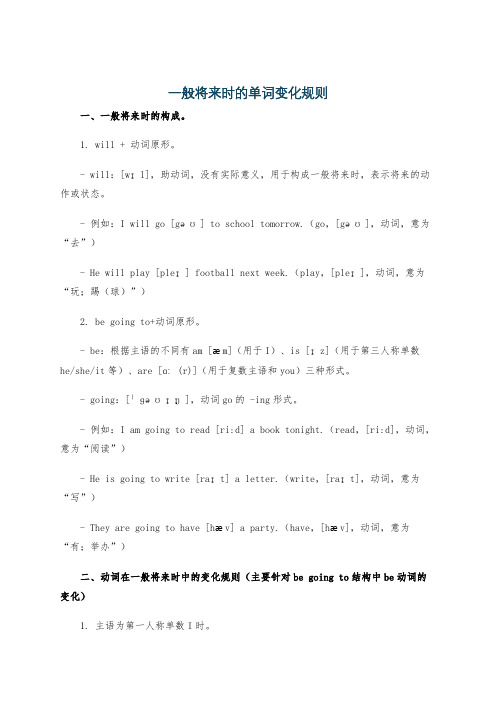
一般将来时的单词变化规则一、一般将来时的构成。
1. will + 动词原形。
- will:[wɪl],助动词,没有实际意义,用于构成一般将来时,表示将来的动作或状态。
- 例如:I will go [gəʊ] to school tomorrow.(go,[gəʊ],动词,意为“去”)- He will play [pleɪ] football next week.(play,[pleɪ],动词,意为“玩;踢(球)”)2. be going to+动词原形。
- be:根据主语的不同有am [æm](用于I)、is [ɪz](用于第三人称单数he/she/it等)、are [ɑː(r)](用于复数主语和you)三种形式。
- going:[ˈɡəʊɪŋ],动词go的 -ing形式。
- 例如:I am going to read [ri:d] a book tonight.(read,[ri:d],动词,意为“阅读”)- He is going to write [raɪt] a letter.(write,[raɪt],动词,意为“写”)- They are going to have [hæv] a party.(have,[hæv],动词,意为“有;举办”)二、动词在一般将来时中的变化规则(主要针对be going to结构中be动词的变化)1. 主语为第一人称单数I时。
- be动词用am。
例如:I am going to visit ['vɪzɪt] my grandparentsthis weekend.(visit,['vɪzɪt],动词,意为“拜访”)2. 主语为第三人称单数(he/she/it等)时。
- be动词用is。
例如:She is going to sing [sɪŋ] a song at the concert.(sing,[sɪŋ],动词,意为“唱歌”)3. 主语为第二人称you或者复数(we/they等)时。
六种常用一般将来时表示法一
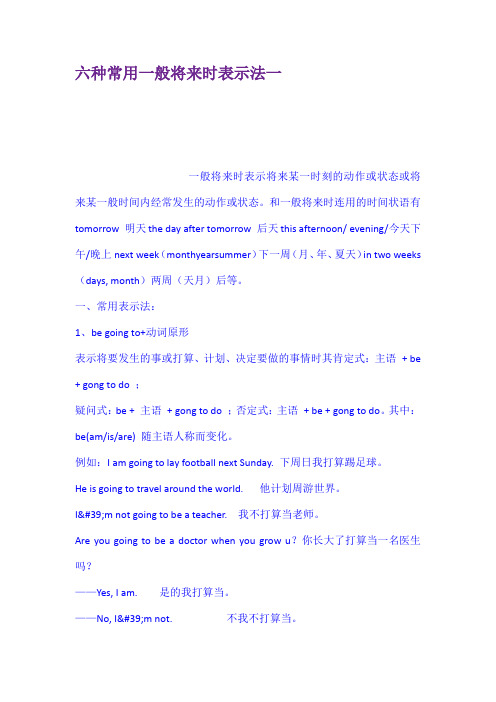
六种常用一般将来时表示法一一般将来时表示将来某一时刻的动作或状态或将来某一般时间内经常发生的动作或状态。
和一般将来时连用的时间状语有tomorrow 明天the day after tomorrow 后天this afternoon/ evening/今天下午/晚上next week (monthyearsummer)下一周(月、年、夏天)in two weeks (days, month)两周(天月)后等。
一、常用表示法:1、be going to+动词原形表示将要发生的事或打算、计划、决定要做的事情时其肯定式:主语+ be + gong to do ;疑问式:be + 主语+ gong to do ;否定式:主语+ be + gong to do。
其中:be(am/is/are) 随主语人称而变化。
例如:I am going to lay football next Sunday. 下周日我打算踢足球。
He is going to travel around the world. 他计划周游世界。
I'm not going to be a teacher. 我不打算当老师。
Are you going to be a doctor when you grow u?你长大了打算当一名医生吗?——Yes, I am. 是的我打算当。
——No, I'm not. 不我不打算当。
注意:be going to后面的动词一定要用原形。
2、主语+will(shall)+动词原形表示将来打算进行或期待发生的动作或状态。
其肯定句:主语+will(shall)+动词原形;疑问句:Will(Shall)+主语+动词原形;否定句:主语+will(shall)not+动词原形。
例如:I will call you this evening. 今天晚上我会给你。
He won't have time to read English. 他不会有时间读英语的。
六年级英语一般将来时讲解加练习
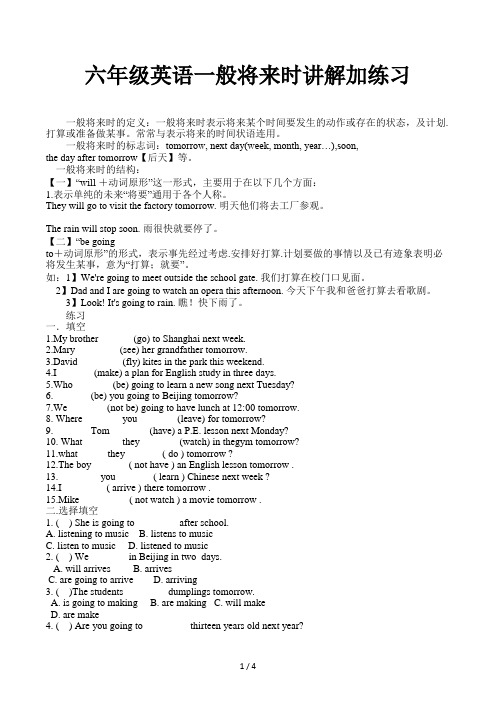
六年级英语一般将来时讲解加练习一般将来时的定义:一般将来时表示将来某个时间要发生的动作或存在的状态,及计划.打算或准备做某事。
常常与表示将来的时间状语连用。
一般将来时的标志词:tomorrow, next day(week, month, year…),soon,the day after tomorrow【后天】等。
一般将来时的结构:【一】“will +动词原形”这一形式,主要用于在以下几个方面:1.表示单纯的未来“将要”通用于各个人称。
They will go to visit the factory tomorrow. 明天他们将去工厂参观。
The rain will stop soon. 雨很快就要停了。
【二】“be goingto+动词原形”的形式,表示事先经过考虑.安排好打算.计划要做的事情以及已有迹象表明必将发生某事,意为“打算;就要”。
如:1】We're going to meet outside the school gate. 我们打算在校门口见面。
2】Dad and I are going to watch an opera this afternoon. 今天下午我和爸爸打算去看歌剧。
3】Look! It's going to rain. 瞧!快下雨了。
练习一.填空1.My brother ______ (go) to Shanghai next week.2.Mary ________ (see) her grandfather tomorrow.3.David ________ (fly) kites in the park this weekend.4.I_______ (make) a plan for English study in three days.5.Who _______ (be) going to learn a new song next Tuesday?6._______ (be) you going to Beijing tomorrow?7.We _______ (not be) going to have lunch at 12:00 tomorrow.8. Where _______ you _______ (leave) for tomorrow?9._______ Tom _______ (have) a P.E. lesson next Monday?10. What _______ they _______ (watch) in thegym tomorrow?11.what _____ they _______( do ) tomorrow ?12.The boy _______( not have ) an English lesson tomorrow .13.________ you _______( learn ) Chinese next week ?14.I ________ ( arrive ) there tomorrow .15.Mike _________ ( not watch ) a movie tomorrow .二.选择填空1. ( ) She is going to ________ after school.A. listening to musicB. listens to musicC. listen to musicD. listened to music2. ( ) We _______ in Beijing in two days.A. will arrivesB. arrivesC. are going to arriveD. arriving3. ( )The students ________ dumplings tomorrow.A. is going to makingB. are makingC. will makeD. are make4. ( ) Are you going to_________ thirteen years old next year?A. will beB. areC. beD. go5. ( ) ___will see a play in 5 days?A. WhenB. WhatC. WhoD. Whose6. ( ) Mary______ English next year.A. will learnB. will to learnC. are going to learn.D. learns7. ( ) He’ll _____ shopping this afternoon.A. goingB. goC. goesD. went8. ( ) Will you ____ at the bus stop at 10:30?A. meetingB. meetsC. meetD. met9. ( ) Lily and I _______ the guitar. next week.A. am going to playB. are going to playC. will playsD. play10. ( ) How ______ Jenny ___ home tomorrow?A. does......goB. is……goingC. will……goD. do……g o11. ( ) Who is going to _________ a song ?A. sings B singing C. to sing D. sing12. ( ) I _________in Beijing in three days.A. are going to arriveB. arriveC. will arriveD. arrives13. ( ) He _______some model planes tomorrow .A. going to makeB. is makingC. will make D makes14. ( ) Are you going to ___________a doctor next year ?A. will beB.. areC. beD. are going to15. ( ) She ________ you make supper this evening .A. helpsB. will helpC. is helpingD. is going help三.把下列句子变成一般疑问句,并给出肯定和否定回答。
一般将来时态精讲
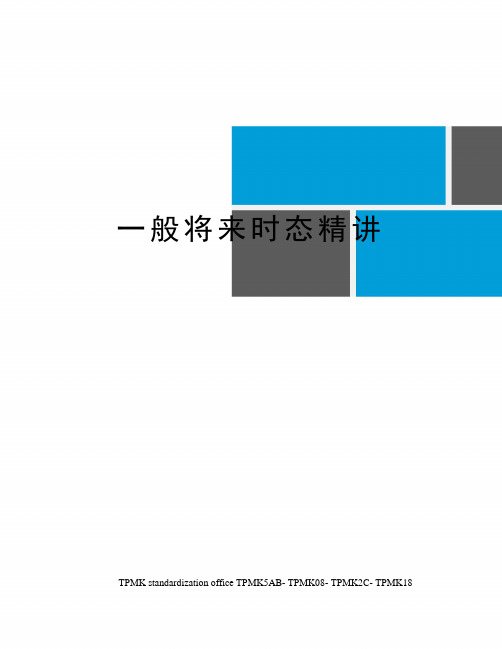
一般将来时态精讲TPMK standardization office TPMK5AB- TPMK08- TPMK2C- TPMK18一般将来时态精讲(一)一般将来时(de)定义一般将来时表示将来某个时间所发生动(de)作或存在(de)状态,也可表示将来经常或反复发生(de)动作,经常与表示将来(de)时间状语连用, 如:soon, tomorrow,next week, in a few days等.例如:Where will you be this time tomorrow 明天这个时候你会在那儿1. 表示将要发生(de)动作或存在(de)状态.例如:I will return the book in a few days. 我过几天会还这本书.2. 表示将来经常或反复发生(de)动作.例如:They will go to the park every Sunday. 他们将每周日去公园.(二)一般将来时(de)构成一般将来时由“助动词shall/will+动词原形”构成.系动词am, is, are都用动词原形be.1. shall用于第一人称后表示一般将来时,一般只限于肯定句和否定句中.shall通常用于第一人称后,由其构成(de)一般疑问句用来询问对方(de)意见,这时(de)shall不含将来含义,也不可被will替代.例如:There’s no one to answer the phone. What shall we do 没有人接,我们该怎么办2.美国英语中,不论什么人称和数,一律用“will+动词原形”.在口语中,will常缩写为’ll,与主语连写在一起.如:I’ll, you’ll, he’ll, she’ll, we’ll, they’ll;而shall not常缩写为shan’t,will not常缩写为won’t.(三)一般将来时(de)结构1. 肯定句:主语+shall\will+动词原形.I shall\will work next year. 明年我将要工作了.2. 否定句:主语+shall\ will+not+动词原形.I won’t tell anyone what you said. 你说(de)话我不会告诉任何人.3. 一般疑问句:Shall\Will+主语+动词原形—Will you leave for Beijing next week 下周你将前往北京吗—Yes, I will. 是(de),我将要去. No, I won’t. 不,我不去.4. 特殊疑问句“特殊疑问词+一般疑问句”(de)语序,也就是“疑问词+will+主语+动词原形+其他成分”.如果是对主语提问,则主语就不在句子中出现.例如:Who will leave for Beijing next week 下周谁将前往北京(四)There be 句型(de)一般将来时There be 句型(de)一般将来时There will be表示“将来有……”.1. 肯定句:There will be+ 物+ 介词短语+其他.例如:There will be cars in people’s home in the future..将来人们(de)家里会很多(de)小汽车.2. 否定句:There won’t be + 物+介词短语+ 其他.例如:There won’t be any trees in this place in two years.两年后这个地方就不会有树了.3. 疑问句:Will there be +物+介词短语+其他例如:—Will there be less pollution 将来会有更少(de)污染吗—Yes, there will.是(de),会(de).—No, there won’t. 不,不会.(五)be going to 表示将来1.用来表示按计划或安排要发生(de)动作We are going to have a class meeting this afternoon.今天下午我们打算开班会.2.表示推测将要或肯定会发生(de)动作,有“准备;打算”(de)意思.含有be going to 结构(de)句子中往往有表示将来(de)时间状语.例如:Look at the black clouds. It's going to rain.看那些乌云,快要下雨了.结构:肯定句:主语 + be(am,is,are) + going to do sth.否定句:主语 + be(am,is,are)+ not + going to do sth.疑问句:Be(am,is,are)+ 主语 + going to do sthYes, 主语+ am/is/are. / No, 主语+ isn't/aren't. / No, I'm not. They are going to see the car factory next week. (肯定句) They are not going to see the car factory next week. (否定句)-Are they going to see the car factory next week-Yes, they are. (No, they aren't.) (一般疑问句及其回答)注意:There is / are going to be... (注意句型中going to 后面(de)be不能改为have.) 常用来表示将有某事发生.例如:There is going to be a football match next Saturday in our school.下周六我们学校将有一场足球比赛.(六)come, go, leave, arrive,take等表示位置移动(de)动词常用现在进行时表示将要发生(de)动作,它们很少与be going to 结构连用.例如:Miss Sun is coming tonight.今晚孙小姐要来.(七)be going to 和will(de)区别1.will表示说话人认为、相信、希望或假定要发生(de)事,不含任何具体(de)时间,可以指遥远(de)将来;而be going to 指有迹象表明某事即将发生或肯定发生,通常指很快就要发生(de)事情.2. be gong to 和will均可表示意图,但事先考虑过(de)意图用be going to,不是事先考虑过(de)意图用will.一般将来时练习一、单项选择( ) 1. There __________ a meeting tomorrow afternoon.A. will be going toB. will going to beC. is going to beD. will go to be( ) 2. Charlie ________ here next month.A. isn’t workingB. doesn’t workingC. isn’t going toworking D. won’t work( ) 3. He ________ very busy this week, he ________ free next week.A. will be; isB. is; isC. will be; will beD. is;will be( ) 4. There ________ a dolphin show in the zoo tomorrow evening.A. wasB. is going to haveC. will haveD.is going to be( ) 5. –________ you ________ free tomorrow – No. I ________ free the day aftertomorrow.A. Are; going to; willB. Are; going to be; willC. Are; going to; will beD. Are; going to be; will be( ) 6. Mother ________ me a nice present on my next birthday.A. will givesB. will giveC. givesD.give( ) 7. – Shall I buy a cup of tea for you –________. (不,不要.)A. No, you won’t.B. No, you aren’t.C. No, please don’t.D. No, please.( ) 8. – Where is the morning paper – I ________ it for youat once.A. getB. am gettingC. to getD. will get ( ) 9. ________ a concert next SaturdayA. There will beB. Will there beC. There can beD. There are( ) 10. If they come, we ________ a meeting.A. haveB. will haveC. hadD. would have( ) 11. He ________ her a beautiful hat on her next birthday.A. givesB. gaveC. will givingD. isgoing to give( ) 12. He ________ to us as soon as he gets there.A. writesB. has writtenC. will writeD. wrote( ) 13. He ________ in three days.A. coming backB. came backC. will come backD. isgoing to coming back( ) 14. If it ________ tomorrow, we’ll go roller-skating.A. isn’t rainB. won’t rainC. doesn’t rainD. doesn’t fine( ) 15. – Will his parents go to see the Terra Cotta Warriorstomorrow– No, ________ (不去).A. they willn’t.B. they won’t.C. they aren’t.D. they don’t.( ) 16. Who ________ we ________ swimming with tomorrow afternoonA. will; goB. do; goC. will; goingD. shall;go( ) 17. We ________ the work this way next time.A. doB. will doC. going to doD. will doing( ) 18. Tomorrow he ________ a kite in the open air first, and then________ boating in thepark.A. will fly; will goB. will fly; goesC. is going to fly;will goes D. flies; will go( ) 19. The day after tomorrow they ________ a volleyball match.A. will watchingB. watchesC. is watchingD. is going to watch( ) 20. There ________ a birthday party this Sunday.A. shall beB. will beC. shall going to beD. will going to be( ) 21. They ________ an English evening next Sunday.A. are havingB. are going to haveC. will havingD. is going to have( ) 22. ________ you ________ free next SundayA. Will; areB. Will; beC. Do; beD. Are; be( ) 23. He ________ there at ten tomorrow morning.A. willB. isC. will beD. be( ) 24. ________ your brother ________ a magazine from the libraryA. Are; going to borrowB. Is; going to borrowC. Will; borrowsD. Are; going to borrows( ) 25. – Shall I come again tomorrow afternoon –________ (好(de)).A. Yes, pleaseB. Yes, you will.C. No, please.D. No, you won’t.( ) 26. It ________ the year of the horse next year.A. is going to beB. is going toC. will beD. will is( ) 27. ________ open the windowA. Will you pleaseB. Please will youC. You pleaseD. Do you( ) 28. –Let’s go out to play football, shall we – OK. I________.A. will comingB. be going to comeC. comeD. am coming( ) 29. It ________ us a long time to learn English well.A. takesB. will takeC. spendsD. will spend ( ) 30. The train ____ at 11.A. going to arriveB. will be arriveC. is going toD. is arriving二、动词填空1. I ______(leave)in a minute. I ______(finish)all my work before I ______ (leave).2. —How long _____ you _____(study)in our country—I _____(plan)to be here for about one more year.—I _____(hope)to visit the other parts of your country.—What ______ you ______(do)after you ______(leave)here—I ______(return)home and ______(get)a job.3. I ______(be)tired. I ___________(go)to bed early tonight.4. Mary’s birthday is next Monday, her mother __________(give)her a present.5. It is very cold these days. It ___________(snow)soon.6. —_____ you _____(be)here this Saturday —No. I ___________(visit)my teacher.7. —______ I ______(get)you a copy of today’s newspaper —Thank you.8. I am afraid there ______(be)a meeting this afternoon. I can’t join you.9. Mike ___________( not , believe)this until he ______(see)it with his own eyes.10. Most of us don’t think their team ______(win).三、句型转换.1. People in the north often go skating in winter. (next winter)________________________________________________________________________ ______2.There are two cinemas in that town. (next year)________________________________________________________________________ ______3.He comes back late.(in two days)________________________________________________________________________ ______4.She is a conductor of a train.(soon)________________________________________________________________________ ______5.Li Ming is ten years old.(next year)________________________________________________________________________ ______6.I sometimes write to my mother in the evening.(tonight)________________________________________________________________________ ______7.He went there by plane.(some day next year)________________________________________________________________________ ______8.China is a modern and strong country.(in twenty years)________________________________________________________________________ ______9.Do you study hard(from now on)________________________________________________________________________ ______10.She didn’t speak English at the meeting.(before long)________________________________________________________________________ ______。
英语主谓宾例句八种时态的例子
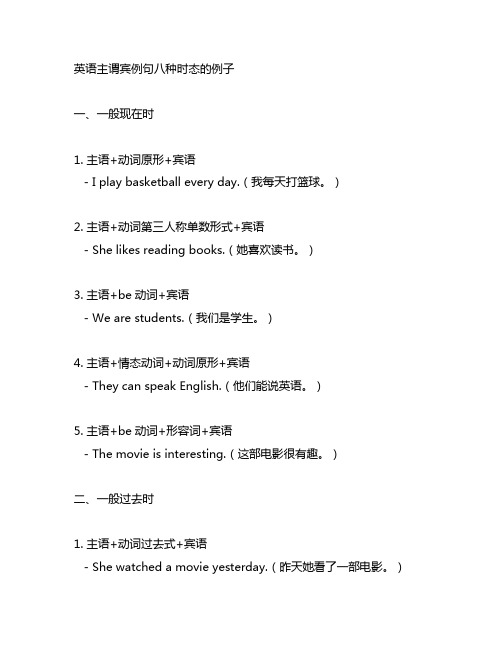
英语主谓宾例句八种时态的例子一、一般现在时1. 主语+动词原形+宾语- I play basketball every day.(我每天打篮球。
)2. 主语+动词第三人称单数形式+宾语- She likes reading books.(她喜欢读书。
)3. 主语+be动词+宾语- We are students.(我们是学生。
)4. 主语+情态动词+动词原形+宾语- They can speak English.(他们能说英语。
)5. 主语+be动词+形容词+宾语- The movie is interesting.(这部电影很有趣。
)二、一般过去时1. 主语+动词过去式+宾语- She watched a movie yesterday.(昨天她看了一部电影。
)2. 主语+be动词过去式+宾语- They were happy last night.(他们昨晚很开心。
)三、一般将来时1. 主语+will+动词原形+宾语- We will go to the park tomorrow.(我们明天会去公园。
)2. 主语+be going to+动词原形+宾语- She is going to visit her grandparents next week.(下周她会去拜访奶奶和爷爷。
)四、现在进行时1. 主语+be动词+动词-ing形式+宾语- They are studying English now.(他们现在正在学习英语。
)2. 主语+be动词+动词-ing形式+时间状语+宾语- He is watching TV at the moment.(他现在正在看电视。
)五、过去进行时1. 主语+be动词过去式+动词-ing形式+宾语- I was reading a book at this time yesterday.(昨天这个时候我正在读一本书。
)六、将来进行时1. 主语+will+be动词+动词-ing形式+宾语- We will be w本人ting for you at the 本人rport tomorrow.(我们明天会在机场等你。
动词时态一般将来时的用法

动词时态一般将来时的用法动词时态包含了多种不同的形式,每种形式都传达了特定的时间信息。
在英语中,一般将来时是用来表达将来发生的动作、事件或状态的。
本文将详细介绍一般将来时的用法,并提供一些例句来帮助读者更好地理解。
一、一般将来时的定义一般将来时是用来表达明确的将来发生的动作或状态。
通常使用的助动词是will或shall,根据主语的不同而定。
二、一般将来时的构成1. 肯定句结构:主语 + will + 动词原形例如:- I will go shopping tomorrow.- He will travel to Europe next week.2. 否定句结构:主语 + will + not + 动词原形,或主语 + won't + 动词原形例如:- She will not visit her grandparents this weekend.- They won't attend the party.3. 疑问句结构:Will + 主语 + 动词原形?例如:- Will you join us for dinner?- Will they arrive on time?三、一般将来时的用法1. 表达自愿或意愿一般将来时常常用来表达主观上的决定、打算或愿望。
例如:- I will help you with your project.- He will volunteer at the local charity organization.2. 表示未来的计划或安排一般将来时可用于描述预定的时间表或安排。
例如:- We will have a meeting at 9am tomorrow.- They will arrive at the airport in the evening.3. 表示预测或推测有时,我们可以根据现有的证据或情况,使用一般将来时来推测未来可能发生的事情。
Unit 6一般将来时be going to(重点语法提升练) (人教版)

2022-2023学年八年级英语上册单元模块满分必刷题(人教版)Unit 6【刷语法】(重点语法提升练) 一般将来时be going to一般将来时一般将来时表示将来某一时刻的动作或状态,或将来某一段时间内经常的动作或状态。
常与一些表示将来的时间状语连用,如:tomorrow(明天),next week(下周),from now on(从现在开始);in the future(将来),in a few days等。
1、基本结构:be going to+动词原形一般将来时:be going to+动词原形意为自己打算做某事、计划做某事或者有意做某事,be 动词随主语不同可变为is,am,are.它的句式变化如下:一、单项选择1.(2021·河北·石家庄市第四十二中学八年级期中)— What is your plan for next weekend, Lingling?— I ________ volunteer(志愿者) work in the museum.A.is going to do B.did C.am going to do D.does2.(2022·江苏·八年级课时练习)Look! It is dark outside. I think it ________ soon.A.is going to rain B.rains C.is raining D.rained3.There ________ a basketball competition this weekend.A.will take place B.will hold C.is going to be D.will have4.(2021·重庆市璧山中学校八年级期中)—Look at the poster on the wall!—Wow! There _______ an art show next month in Bishan Middle School.A.is going to be B.is going to have C.are going to be D.are going to have 5.(2021·上海奉贤·八年级期中)There is going to ________ a football match this afternoon.A.have B.has C.is D.be6.(2021·山东济南·八年级期中)—What do you plan to do this weekend?—We ________ soccer. We play it once a week.A.play B.playedC.are going to play D.are playing7.(2021·广东·湛江一中培才学校八年级期中)There ________ a concert at 7:00 this evening.A.is going to have B.is going to be C.is having D.will have8.(2021·河北·石家庄市第二十八中学八年级期中)There ________ two new movies in Sunshine Movie Theater tonight.A.is going to have B.will have C.is going to be D.are going to be 9.(2021·河北·石家庄市第二十八中学八年级期中)—Shall we go to the museum tomorrow?—I’d love to, but I’m afraid I can’t. I ________ my grandparents.A.visit B.visited C.am going to visit D.is visiting 10.(2021·河北·石家庄市第二十五中学八年级期中)— Mom, I ________ my clothes when I come back home.— OK. You promise me.A.am washing B.am going to wash C.washed D.wash11.(2021·黑龙江·哈尔滨市第十七中学校八年级期中)—Are there any robots in your home now?—No, but there ________ a lot of robots in people’s homes ________.A.will be, 100 years ago B.are going to have, in 100 years C.are going to be, in 100 years 12.(2019·福建省福州第十九中学八年级期中)Look at those big black clouds. It ________ rain. Let’s hurry.A.must B.will C.would D.is going to 13.(2021·广东·东莞市新世纪英才学校八年级期中)________ your cousin ________ me next week? A.Is; going to visit B.Does; going to visit C.Is; goes to visit D.Does; goes to visit 14.(2018·广东·珠海市斗门区实验中学八年级期中)—My sister and I _________ the park this Sunday. Do you want to go with us?A.visit B.visits C.visited D.are going to visit 15.(2020·辽宁·灯塔市教师进修学校八年级期中)There is going to ________ a meeting the day aftertomorrow(后天).A.have B.be C.has D./二、完成句子16.——本周末打算去哪儿野餐,杰克?——玉湖公园。
初中英语6个时态

初中英语6个时态
初中英语六个时态分别是:现在进行时、现在完成时、现在完成进行时、一般过去时、一般将来时和过去将来时。
1. 现在进行时:表示现在正在进行的动作或存在的状态,基本结构是be动词(am/is/are)+动词的现在分词(动词+ing)。
2. 现在完成时:表示动作发生在过去但与现在有联系,基本结构是have/has+动词的过去分词(done)。
3. 现在完成进行时:表示动作从过去开始一直持续到现在,并且还会继续下去,基本结构是have/has+been+动词的现在分词(doing)。
4. 一般过去时:表示在过去某个时间发生的动作或存在的状态,基本结构是动词的过去式。
5. 一般将来时:表示将来某个时间将要发生的动作或存在的状态,基本结构是will+动词原形。
6. 过去将来时:表示在过去某个时间将要发生的动作或存在的状态,基本结构是would+动词原形。
(完整)初中英语六大时态

六大英语时态一、一般现在时:(1)经常性、习惯性的动作或存在的状态Eg: I go to school on foot.(2) 主语的特征、性格、能力、爱好等Eg: I like watching TV.(3) 客观真理Eg: The moon moves round the earth.其结构按正常语序,即“主语+谓语+其他”。
有时为了起强调作用,时间状语也可提前。
一般现在时的句式变化可分为两种情况:○1一般人称做主语,表示动作变否定句时,须在动词前加助动词don’t;变一般疑问句时,须在句首加助动词do.Eg: 肯定句They have lunch at 12. 否定句:They don’t have lunch at 12. 一般疑问句: Do they have lunch at 12.○2第三人称单数作主语,谓语动词变单三;变否定句时,须在动词前加助动词doesn’t; 变一般疑问句时,须在句首加助动词does Eg: He does morning exercises.→He doesn’t do morning exercises.→Does he often go to school on foot?一般现在时的时间状语有on Saturdays, in the morning(afternoon, evening),every day, at weekend, how often及一些频率副词often, usually, always, sometimes, seldom, never 等。
动词变单三规则1. 一般情况下,在动词后直接加-s Eg: works, gets, says, reads2. 以s, x, sh, ch, o结尾,加-es Eg: goes, teaches, washes, does3. 以“辅音+y” 结尾,变y为i,再加-es Eg: fly-flies, study-studies4. 不规则变化have-has二、一般过去时:表示过去某时发生的动作或情况(1)过去某个时间所发生的动作或存在的状态Eg: He was a worker two years ago.(2) 过去一段时间内,经常性或习惯性的动作Eg: When I was a student, I often played with my classmates.(3)谈到已故人的情况时多用过去时Eg: Lu Xun was a great writer.(4) 有些发生时间不是很清楚(未明确表述)的情况,实际是过去发生的,也应用过去时态Eg: What did you say?一般过去时的结构是“主语+动词的过去式”。
英语的六种时态

英语的六种时态一、一般现在时:概念:经常、反复发生的动作或行为及现在的某种状况。
时间状语:often,usually,always,sometimes,every week(day,year,month...),once a week,on Sundays,etc.基本结构:①be动词;②行为动词否定形式:①am /is /are +not;②此时态的谓语动词若为行为动词,则在其前加don't,如主语为第三人称单数,则用doesn't,同时还原行为动词。
一般疑问句:①把be动词放于句首;②用助动词do提问,如主语为第三人称单数,则用does,同时,还原行为动词。
二、一般过去时:概念:过去某个时间里发生的动作或状态;过去习惯性、经常性的动作、行为。
时间状语:ago,yesterday,the day before yesterday,last week(year,night,month...),in 1989,just now,at the age of 5,one day,long long ago,once upon a time,etc.基本结构:①be动词;②行为动词否定形式:①was/were +not;②在行为动词前加didn't,同时还原行为动词。
一般疑问句:①was或were放在句首;②用助动词do的过去式did提问,同时还原行为动词。
三、现在进行时:概念:表示现阶段或说话时正在进行的动作及行为。
时间状语:now,at this time,these days,etc.基本结构:am/is/are +doing否定形式:am/is/are +not+doing一般疑问句:把be动词放在句首四、过去进行时:概念:表示过去某段时间或某一时刻正在发生或进行的行为或动作。
时间状语:at this time yesterday,at that time或以when引导的谓语动词是一般过去时的时间状语等。
when的用法时态
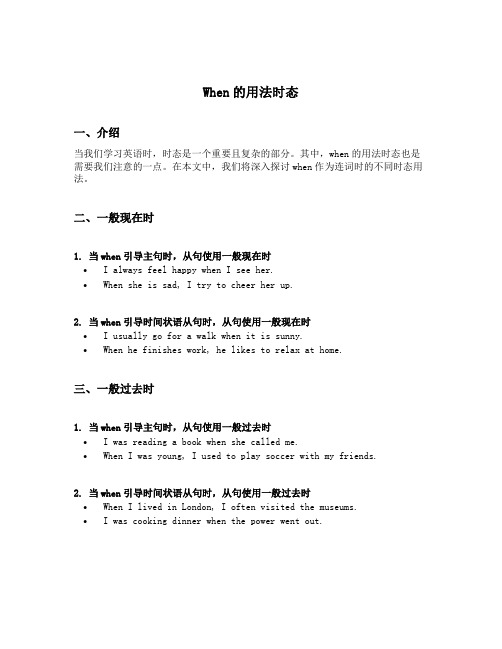
When的用法时态一、介绍当我们学习英语时,时态是一个重要且复杂的部分。
其中,when的用法时态也是需要我们注意的一点。
在本文中,我们将深入探讨when作为连词时的不同时态用法。
二、一般现在时1. 当when引导主句时,从句使用一般现在时•I always feel happy when I see her.•When she is sad, I try to cheer her up.2. 当when引导时间状语从句时,从句使用一般现在时•I usually go for a walk when it is sunny.•When he finishes work, he likes to relax at home.三、一般过去时1. 当when引导主句时,从句使用一般过去时•I was reading a book when she called me.•When I was young, I used to play soccer with my friends.2. 当when引导时间状语从句时,从句使用一般过去时•When I lived in London, I often visited the museums.•I was cooking dinner when the power went out.四、现在进行时1. 当when引导主句时,从句使用现在进行时•She is always laughing when I see her.•When I am studying, I prefer to listen to music.2. 当when引导时间状语从句时,从句使用现在进行时•I will call you when I am leaving the office.•When it is raining, I like to stay indoors and watch movies.五、过去进行时1. 当when引导主句时,从句使用过去进行时•I was sleeping when the phone rang.•When he arrived, I was having dinner.2. 当when引导时间状语从句时,从句使用过去进行时•When I was traveling in Europe, I was staying in hostels.•I was studying for my exams when my friends came over.六、一般将来时1. 当when引导主句时,从句使用一般将来时•I will call you when I arrive at the airport.•When she finishes her project, she will take a vacation.2. 当when引导时间状语从句时,从句使用一般将来时•I will go shopping when I have some free time.•When the rain stops, we will go for a walk.七、过去将来时1. 当when引导主句时,从句使用过去将来时•I thought of you when I was going to bed last night.•When he told me the news, I was about to leave.2. 当when引导时间状语从句时,从句使用过去将来时•I was going to call you when I saw your missed call.•When I was about to leave, the bus arrived.八、总结通过本文的介绍,我们了解了when作为连词时在不同时态下的用法。
一般将来时的几种语法形式
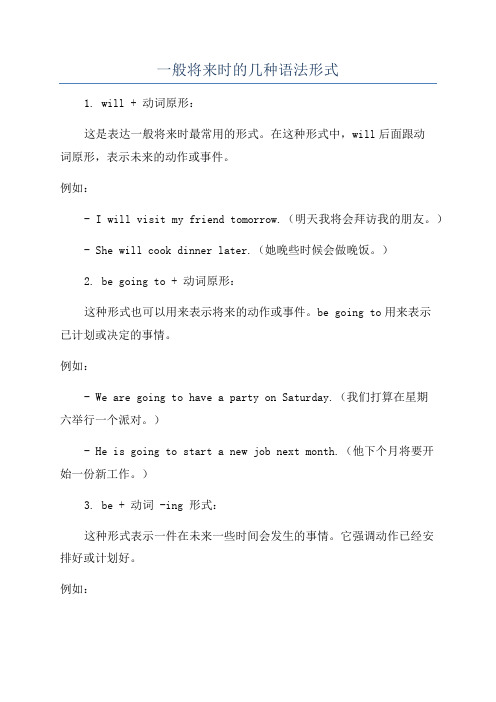
一般将来时的几种语法形式1. will + 动词原形:这是表达一般将来时最常用的形式。
在这种形式中,will后面跟动词原形,表示未来的动作或事件。
例如:- I will visit my friend tomorrow.(明天我将会拜访我的朋友。
)- She will cook dinner later.(她晚些时候会做晚饭。
)2. be going to + 动词原形:这种形式也可以用来表示将来的动作或事件。
be going to用来表示已计划或决定的事情。
例如:- We are going to have a party on Saturday.(我们打算在星期六举行一个派对。
)- He is going to start a new job next month.(他下个月将要开始一份新工作。
)3. be + 动词 -ing 形式:这种形式表示一件在未来一些时间会发生的事情。
它强调动作已经安排好或计划好。
例如:- They are traveling to Paris next week.(他们下周去巴黎旅行。
)- I am meeting my friends for lunch tomorrow.(明天我将与朋友们见面吃午饭。
)4. be about to + 动词原形:这种形式表示即将发生的事情,比如在不远的将来要发生的事情。
例如:- The movie is about to start.(电影即将开始。
)- She is about to graduate from university.(她即将大学毕业。
)5. be to + 动词原形:这种形式常用于官方通知、计划或安排。
它表示将要发生的事情是按照提前安排的程序进行。
例如:- The meeting is to be held tomorrow.(会议定于明天举行。
)- The train is to arrive at 9 o'clock.(火车将于9点钟到达。
六种常用一般将来时表示法
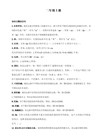
——No, he will not.不,他不会。
注意:在书面语中,主语是第一人称I(We)时,常用shall,即I(We)+shall+动词原形,也可用will。
例如:Shall we have any class tomorrow?明天我们有课吗?
——Yes,we will(we shall).是的,我们明天有课。
10. She_____(have)a concert the next year.
Keys:1、will…arrive 2、will be 3、am going to buy 4、are to 5、will not take
6、has, will go 7、come 8、returns, will let 9、will send, are 10、will have
一、常用表示法:
1、be going to+动词原形
表示将要发生的事,或打算、计划、决定要做的事情时,其肯定式:主语 + be + gong to do ;
疑问式:be + 主语 + gong to do ;否定式:主语 + be + gong to do。其中:be(am/is/are) 随主语人称而变化。
人教PEP版英语六年级下册 语法专题:一般将来时

一般将来时定义:一般将来时表示在现在看来即将要发生的动作或存在的状态。
常用时间副词tomorrow, soon或短语next year / week / month, in a few days, in the future, sometime 做状语。
如:What will you do this afternoon?你今天下午干什么?We will have a meeting tomorrow. 我们明天要开会。
用法及构成:1.一般将来时的基本用法是表示单纯的将来事实,由“will + 动词原形”构成:①We will have a lot of rain next month. 下个月将下很多雨。
②I think she will pass the exam. 我想他考试会及格的。
2.用“be going to+动词原形”表示。
主要表示打算和预测:①We are not going to stay there long. 我们不准备在那里多待。
(表打算)②I’m afraid they’re going to lose the game. 恐怕他们会赛输。
(表预测)③Look, it’s going to rain. 瞧,要下雨了。
(表预见)练习题:( ) 1. There __________ a meeting tomorrow afternoon.A. will be going toB. will going to beC. is going to beD. will go to be( ) 2. Charlie ________ here next month.A.isn’t workingB. doesn’t workingC. isn’t going to workingD. won’t work ( ) 3. He ________ very busy this week, he ________ free next week.A. will be; isB. is; isC. will be; will beD. is; will be( ) 4. There ________ a dolphin show in the zoo tomorrow evening.A. wasB. is going to haveC. will haveD. is going to be ( ) 5. –_____ you _____ free tomorrow?– No. I ______ free the day after tomorrow.A. Are; going to; willB. Are; going to be; willC. Are; going to; will beD. Are; going to be; will be( )6. Mother ________ me a nice present on my next birthday.A.will givesB. will giveC. givesD. Give( )7. – Shall I buy a cup of tea for you?–________. (不,不要。
动词时态简单8种

一、一般现在时二、一般过去时三、一般将来时四、过去将来时五、现在进行时六、过去进行时七、现在完成时八、过去完成时时态(Tense)是表示行为、动作和状态在各种时间条件下的动词形式。
因此,当我们说时态结构的时候,指的是相应时态下的动词形式。
一、一般现在时(一)、含义表示经常发生的动作或经常存在的状态,以动词原形表示(单数第三人称用动词的-s 形式)。
否定句和各种疑问句靠特殊疑问词助动词do (does)构成。
动词第三人称单数的变化规则:(二)、用法A) 表示现在发生的动作或状况,或反复、习惯性的动作:表示一直贯穿或反复发生于包括现在在内的整个时间的动作或状态(这是该时态最重要的用法),常用频度时间状语:always,often,seldom,sometimes,usually,never ,hardly,every day(week,...),once(twice,...),a day(week,...)等。
例如:Does he go running three times a week? 他每周跑步三次吗?He always helps others. 他总是帮助别人。
She lives in a large house. 她住在一间大屋里。
She doesn’t know how to say that in English.He leaves for school at 6:30 AM.B)表示客观真理和科学事实:表示没有时间限制的客观真理和科学事实。
例如:What boils at 100℃?----Water does什么在摄氏度100度沸腾?----水The sky is blue.The earth travels round the sun.Paris is the capital of France.C)表示现刻行为:表示具有持续性(或长或短)的现在发生行为(多为状态动词)。
例如:I agree with you completely. Don’t doubt it.我完全同意你的意见。
一般将来时定义,结构,标志词,用法,变化规则
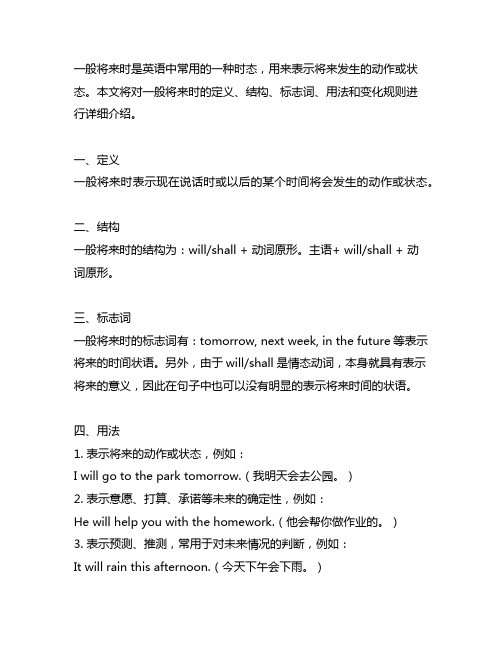
一般将来时是英语中常用的一种时态,用来表示将来发生的动作或状态。
本文将对一般将来时的定义、结构、标志词、用法和变化规则进行详细介绍。
一、定义一般将来时表示现在说话时或以后的某个时间将会发生的动作或状态。
二、结构一般将来时的结构为:will/shall + 动词原形。
主语+ will/shall + 动词原形。
三、标志词一般将来时的标志词有:tomorrow, next week, in the future等表示将来的时间状语。
另外,由于will/shall是情态动词,本身就具有表示将来的意义,因此在句子中也可以没有明显的表示将来时间的状语。
四、用法1. 表示将来的动作或状态,例如:I will go to the park tomorrow.(我明天会去公园。
)2. 表示意愿、打算、承诺等未来的确定性,例如:He will help you with the homework.(他会帮你做作业的。
)3. 表示预测、推测,常用于对未来情况的判断,例如:It will rain this afternoon.(今天下午会下雨。
)五、变化规则1. 肯定句的一般将来时结构为:will/shall + 动词原形。
例如:She wille to see me tomorrow.(她明天会来看我。
)2. 否定句的一般将来时结构为:will/shall + not + 动词原形。
例如:I will not go to the party tonight.(我今晚不会去参加派对。
)3. 疑问句的一般将来时结构为:will/shall + 主语+ 动词原形。
例如:Will youe to the meeting tomorrow?(你明天会来参加会议吗?)以上就是关于一般将来时的定义、结构、标志词、用法和变化规则的详细介绍。
希望对您有所帮助。
一般将来时是英语中最常用的一种时态之一,用于表示将来会发生的动作或状态。
一般将来时
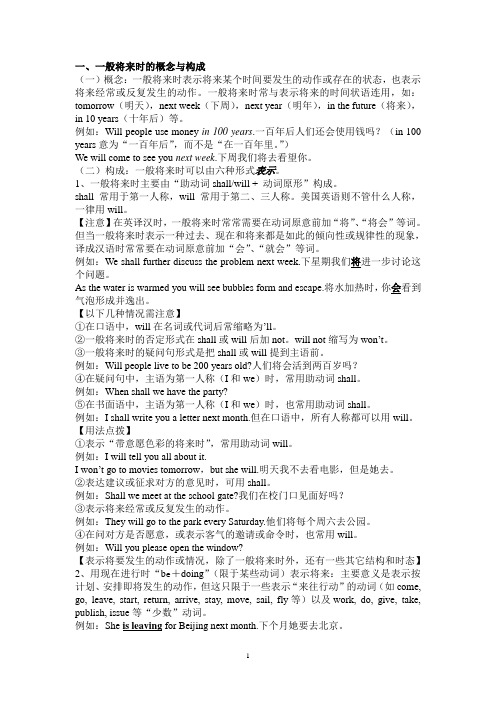
一、一般将来时的概念与构成(一)概念:一般将来时表示将来某个时间要发生的动作或存在的状态,也表示将来经常或反复发生的动作。
一般将来时常与表示将来的时间状语连用,如:tomorrow(明天),next week(下周),next year(明年),in the future(将来),in 10 years(十年后)等。
例如:Will people use money in 100 years.一百年后人们还会使用钱吗?(in 100 years意为“一百年后”,而不是“在一百年里。
”)We will come to see you next week.下周我们将去看望你。
(二)构成:一般将来时可以由六种形式表示。
1、一般将来时主要由“助动词shall/will + 动词原形”构成。
shall 常用于第一人称,will常用于第二、三人称。
美国英语则不管什么人称,一律用will。
【注意】在英译汉时,一般将来时常常需要在动词原意前加“将”、“将会”等词。
但当一般将来时表示一种过去、现在和将来都是如此的倾向性或规律性的现象,译成汉语时常常要在动词原意前加“会”、“就会”等词。
例如:We shall further discuss the problem next week.下星期我们将进一步讨论这个问题。
As the water is warmed you will see bubbles form and escape.将水加热时,你会看到气泡形成并逸出。
【以下几种情况需注意】①在口语中,will在名词或代词后常缩略为’ll。
②一般将来时的否定形式在shall或will后加not。
will not缩写为won’t。
③一般将来时的疑问句形式是把shall或will提到主语前。
例如:Will people live to be 200 years old?人们将会活到两百岁吗?④在疑问句中,主语为第一人称(I和we)时,常用助动词shall。
河北中考六大时态

一般将来时
simple future tense
构成
1.主语+will+do+其他
2.主+am/is/are+going to do +其他
一般将来时用法
将来状态 There will be rain tomorrow.
C. was talking D. have talked
3. He is always__lies like that. Nobody likes him.
A. telling B. tell C. told D. to tell
Good job! There is nothing but a cup of coffee for you!
态
《中考说明》指出:
一般现在时
六 一般过去时 种 一般将来时 时 现在进行时 态 过去进行时
现在完成时
一般现在时
simple present tense
构成 1.主语+be(am/is/are)+其他 2.主语+do/does+其他
一般现在时用法
习惯活动和
1.I get up at six every morning. 2.She likes pop music.
一般过去时
simple past tense
构成 1.主语+was/were+其他 2.主语+did+其他
一般过去时用法
过去动作 I saw him yesterday. 过去状态 I was in Grade One last year.
- 1、下载文档前请自行甄别文档内容的完整性,平台不提供额外的编辑、内容补充、找答案等附加服务。
- 2、"仅部分预览"的文档,不可在线预览部分如存在完整性等问题,可反馈申请退款(可完整预览的文档不适用该条件!)。
- 3、如文档侵犯您的权益,请联系客服反馈,我们会尽快为您处理(人工客服工作时间:9:00-18:30)。
初中基础语法——时态三、一般将来时概念:一般将来时表示将来某一时刻的动作或状态,或将来某一段时间内经常的动作或状态。
常常和表示将来的时间状语连用。
如:tomorrow(明天),next week(下周),from now on(从现在开始);in the future(将来)等。
一般将来时由助动词shall(第一人称),will(第二、三人称)动词原形构成。
基本构成:be going to表示主观的打算或计划。
shall和will 常常缩写成'll ,紧接在主语之后。
其否定式shall not 和will not 的缩写式分别为shan't 和won't。
be to表示客观安排或受人指示而作某事。
后+动词原形。
be about to+动词原形,意为马上作某事,不能与tomorrow,next week等表示明确将来时的时间状语连用。
句型:肯定句、否定句、疑问句被动句:will/shall+be+v.ed(及物动词过去分词)The letter will be sent tomorrow.这封信明天将寄出去We shall be punished if we break the rule.如果我们违反规定,我们将受到惩罚。
注意:will和shall在句子中所表达的“意志”是不同的,当句子主语是第一人称(I)的时候表示的是主语I 的自主“意志”,很多人可能会问什么是自主意志。
例:I will be clear tomorrow . 我会把这件事弄个水落石出(词句有多个意思,这里举此例)分析:这个句子中用will时,主语I(我)就带有强烈的意志,意思是我想让事情水落石出,并且有我会为此付诸努力的意思。
当第一人称,用shall的时候就是一个普通的句子,就没有主语的意志。
I shall come back in ten minutes .这句话就是单纯的说我会在10分钟后回来没有别的意思I will come back in ten minutes. 而这句话就有一种意境上的不同。
我会在10分钟后回来,其中的意思还有,就算我有事耽搁了我也会想办法在10分钟后回来的意思shall在第二、三人称时也和will在第一人称一样。
也只有在二三人称才带有意志,只不过shall带有的是“说话者”的意志。
而不是主语的意志。
如:he shall be rewarded. 他会得到回报分析这句话更深度的意思,我说过在shall用在第二三人称时有强烈的“说话者”的意志。
而这句话的“说话者”意志就是他会得到回报,就算他没有得到回报“说话者”也会想办法让“he”得到回报。
形式●will 常简略为'll,并与主语连写在一起,如:I'll,she'll,he'll,it'll,we'll,you'll,they'll。
●一般疑问句如用will you…?其简略答语须是Y es,I will或No,I won't;如用Shall I…?(较少见)其简略答语须是Y es,I shall.或No,I shall not.进行时表将来,与瞬间动词连用。
编辑本段表达方法一般将来时一般将来时表示将来某个时间要发生的动作或存在的状态,也表示将来经常或反复发生的动作。
常常与表示将来的时间状语连用。
常用的表达形式共有五种,现归纳如下:用will或shall表示“助动词will或shall+动词原形”这一形式,表示将来发生的事情,用于征求对方的意见或表示客气的邀请。
在口语中will用于所有人称,书面语中第一人称常用shall【其实will也可以用到】。
如:1. Tomorrow will be Sunday. 明天就是星期天。
2. The rain will stop soon. 雨很快就要停了。
3. Shall we go there at five? 我们五点钟去那儿,好吗?4. Will you please open the door? 请你把门打开,好吗?用be going to结构表示“be going to+动词原形”用来表示近期或事先考虑过的将要发生的动作以及已有迹象表明必将发生某事,意为“打算;就要”。
如:1. We're going to meet outside the school gate. 我们打算在校门口见面。
2. Look! It's going to rain. 瞧!快下雨了。
用现在进行时表示表示位置转移的动词(如:go, come, leave, start, arrive等),可用现在进行时表示将来时。
如:1. Uncle Wang is coming. 王叔叔就要来了。
2. They're leaving for Beijing. 他们即将前往北京。
用一般现在时表示根据规定或时间表预计要发生的动作,在时间和条件状语从句中,都可用一般现在时表示将来时。
如:1. The new term starts (begins) on August 29th. 新学期八月二十九日开学。
2. If it doesn't rain tomorrow, we will go out for a picnic. 如果明天不下雨,我们将出去野餐。
用“be+动词不定式”或用“be about to +动词原形”的结构表示如:1. He is to visit Japan next year. 明年他将访问日本。
2. They're about to leave. (=They're leaving.) 他们就要走了。
编辑本段结构一、常见结构1、will / shall + 动词原形否定句加在will/shall后加not这种方法一般单纯地表示将来某个时间将要发生的动作或存在的状态。
will用于各种人称;shall只用于第一人称。
例如:I will / shall go to visit him next week. 下周我将去拜访他。
What time shall we go there tomorrow? 明天我们几点去那儿?2、be going to 动词原形be going to 相当于一个助动词(其中be有人称和数的变化),与它后面的动词原形一起构成谓语。
用来表示近期将要发生的动作或存在的状态,以及计划、安排、打算要做的事。
例如:There is going to be a football match this afternoon.今天下午将有一场足球赛。
I…m going to go to the park. 我将要去公园。
二、常用结构1、用于"I expect, I'm sure, I think, I wonder 宾语从句"中。
Don't worry about the exam. I'm sure you'll pass.不要担心这次考试,我确信你会通过的。
2、用于祈使句和陈述句中。
Work hard and you will succeed.如果你努力,就会成功的。
3、与表示时间或条件的状语从句连用。
I'll let you know as soon as he arrives.他一到我就通知你。
编辑本段用法(1)一般将来时表示将要发生的动作或情况。
例如:I will(shall) arrive tomorrow.我明天到。
(主语是第一人称时最好用shall)Will you be free tonight? 你今晚有空吗?We won‟t (shan‟t) be busy this evening. 我们今晚不忙。
(2)在一般将来时的句子中,有时有表示将来时间的状语,有时没有时间状语,这时要从意思上判断是否指未来的动作或情况。
例如:Will she come? 她(会)来吗?(3)在以第一人称I或we作主语的问句中,一般使用助动词shall,这时或是征求对方的意见,或是询问一个情况(b):a. Where shall we meet? 我们在哪儿碰头?b. Shall we have any classes tomorrow?明天我们有课吗?在这类问句中,近年来也有不少人用will,特别是在美国。
例如:How will I get there? 我怎么去?(4)be going to+ 动词原形a.表示计划、打算、准备做的事。
例如:We are going to put up a building here.我们打算在这里盖一座楼。
How are you going to spend your holidays?假期你准备怎样过?b.表示即将发生或肯定要发生的事。
例如:I think it is going to snow. 我看要下雪了。
编辑本段其他用法一般将来时表示将来某一时刻的动作或状态,其表达形式除了“shall(第一人称),will(第二、三人称)+动词原形构成”外,还有以下几种形式。
一.“be going to+动词原形”表示即将发生的或最近打算进行的事。
例如:①It is going to rain. 要下雨了。
②We are going to have a meeting today. 今天我们开会。
二.go,come,start,move,sail,leave,arrive,stay,live,fly,等可用进行时态表示按计划即将发生的动作(行进式动词),例如:I'm leaving for Beijing. 三.“be to+动词原形”表示按计划要发生的事或征求对方意见。
例如:①Are we to go on with this work?我们继续干吗?②The boy is to go to school tomorrow.这个男孩明天要去上学。
四.“be about to+动词原形”表示即将发生的动作,意为:很快,马上。
后面一般不跟时间状语。
例如:We are about to leave.我们马上就走。
五.某些词,如come,go,leave,arrive,start,get,stay ,live,fly等的一般现在时也可表示将来。
①The meeting starts at five o'clock.会议五点开始。
②He gets off at the next stop.他下一站下车。
六。
“be due to"构成的谓语,意味“定于…”也可表示将来时PS :will与be going to 的分别be going to与will的区别be going to与will两者都可表示将要发生的事、将要去做某事,但它们有如下几点区别:1. be going to 表示近期、眼下就要发生的事情,will 表示的将来时间则较远一些,如:He is going to write a letter tonight.He will write a book one day.2. be going to 表示根据主观判断将来肯定发生的事情,will表示客观上将来势必发生的事情。
